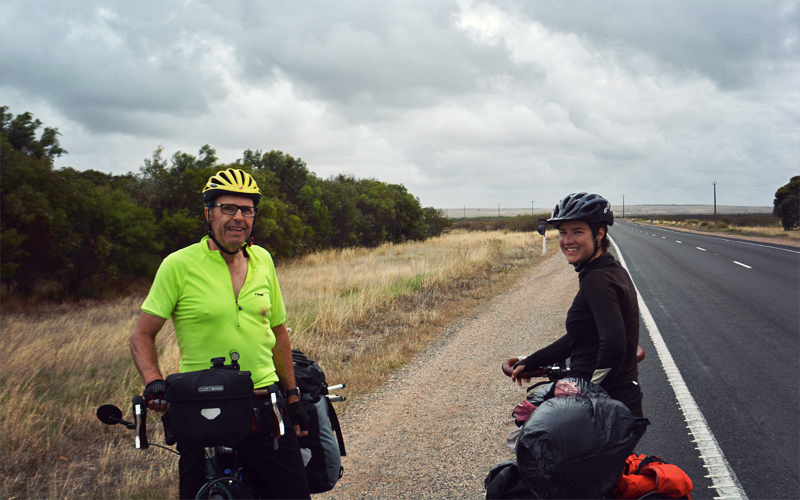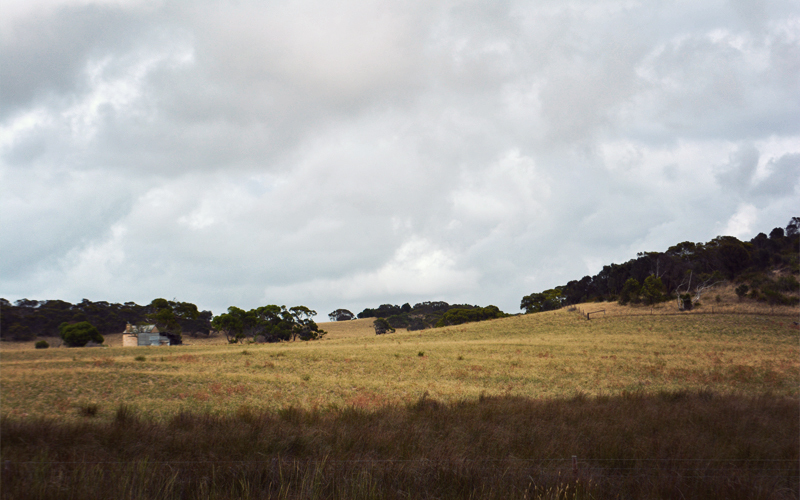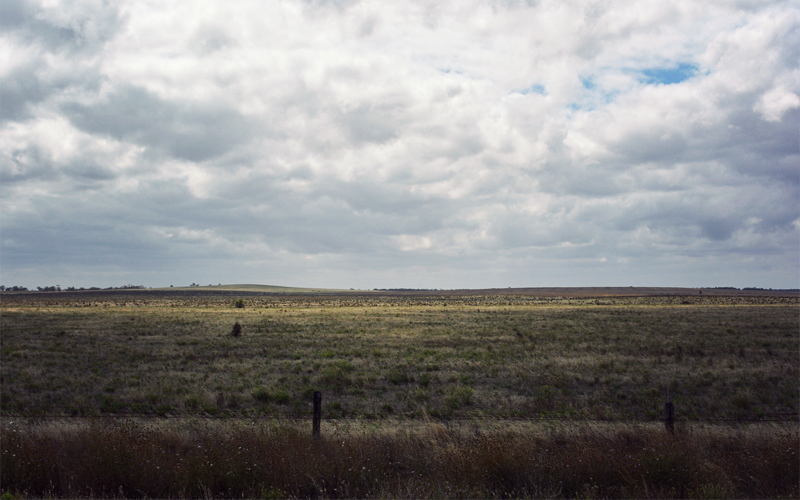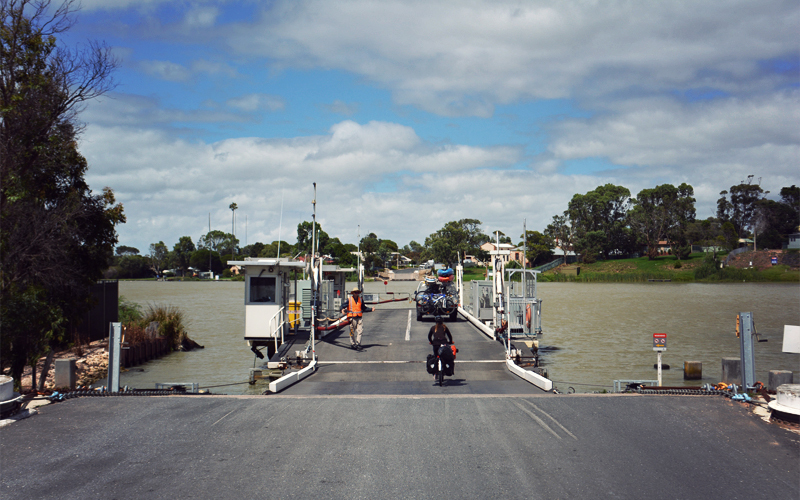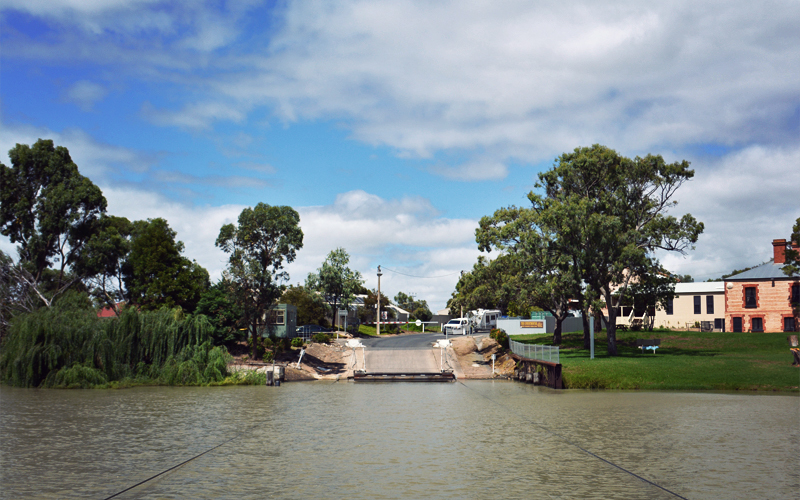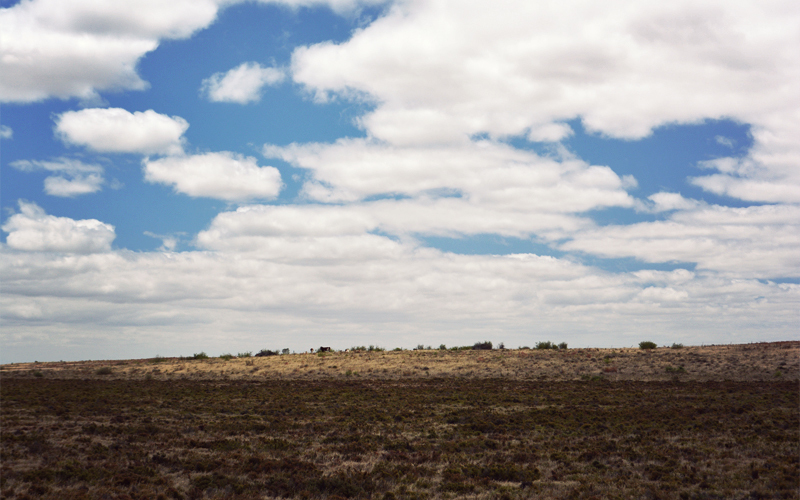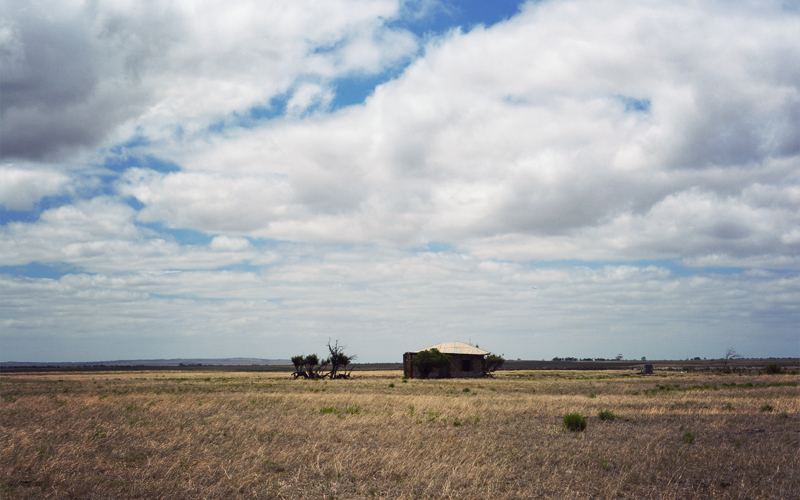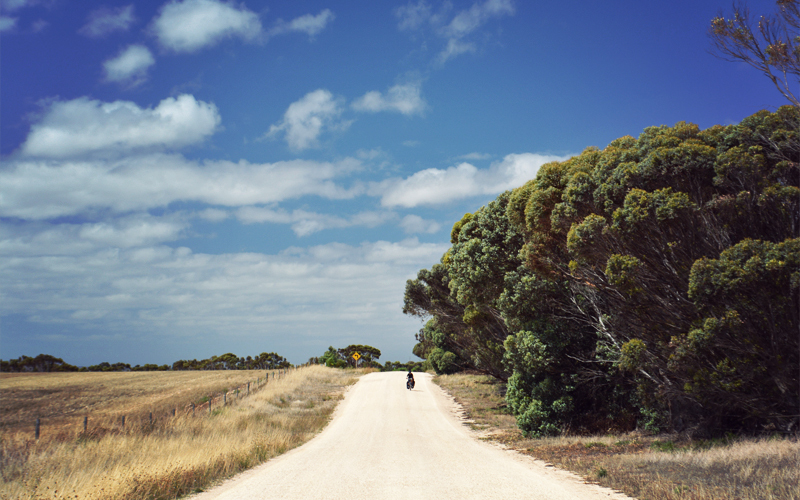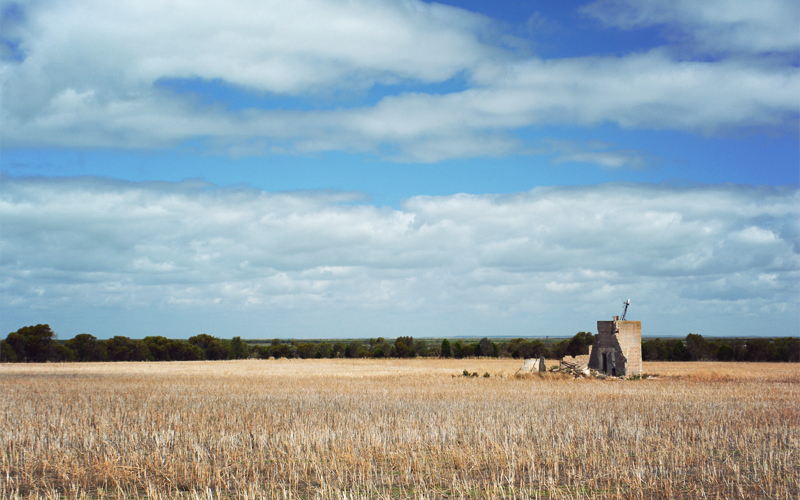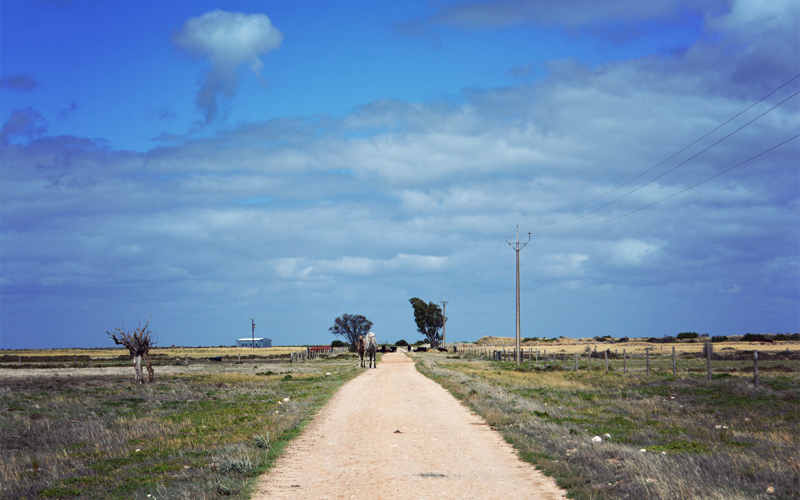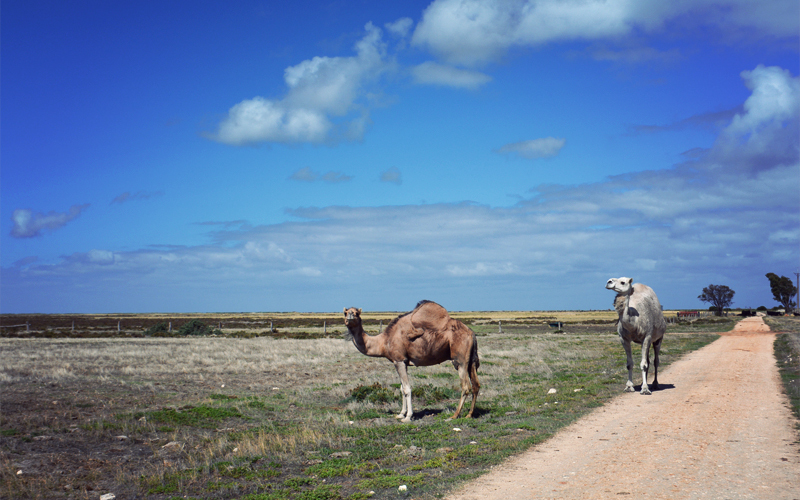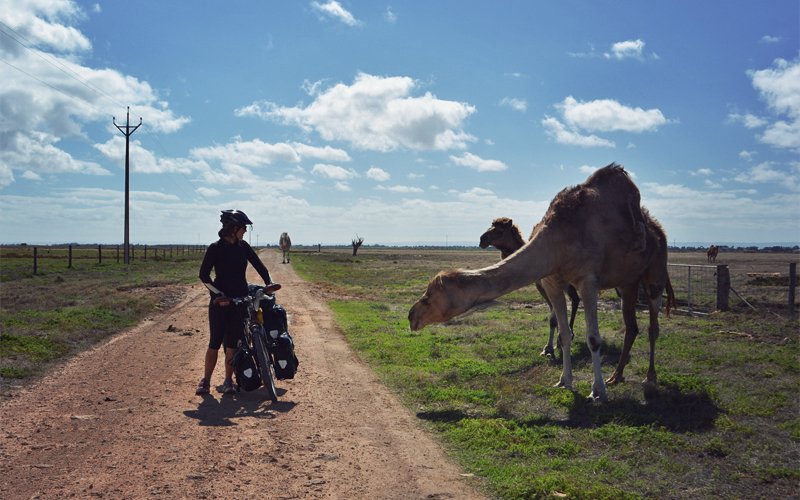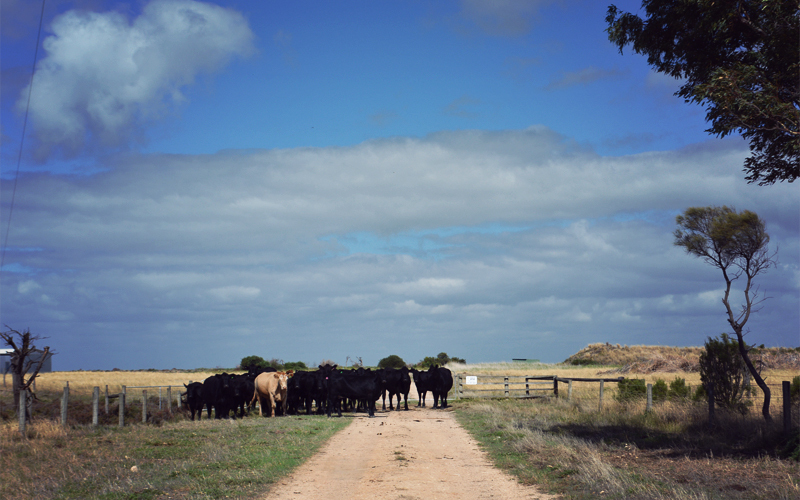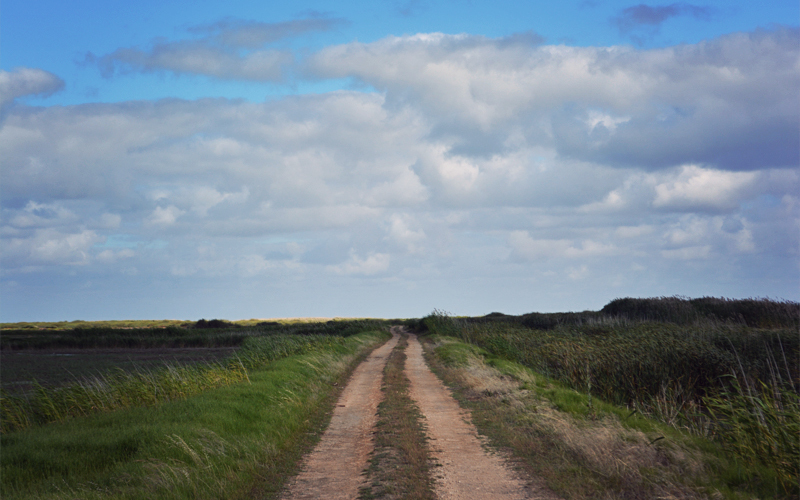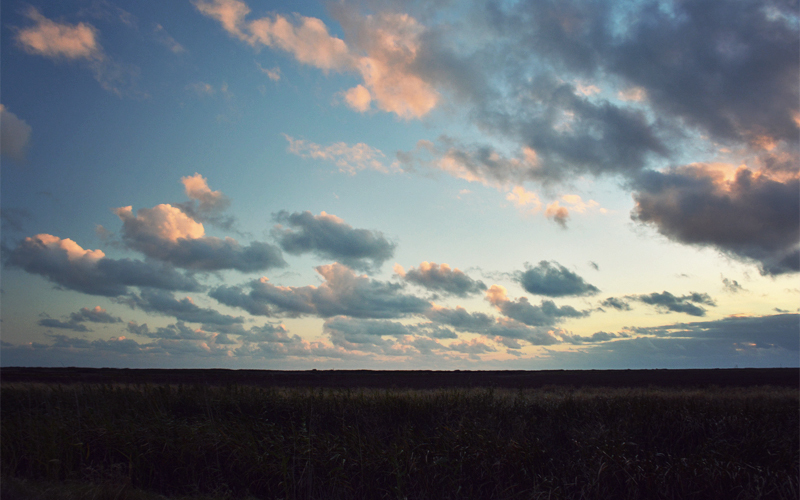January 14, 2015
Day 141: Meningie, SA to Tolderol Game Reserve
The wind never lets up during the night, and by the time we're ready to ride it's already gusting up to thirty miles per hour. But it's also pushing in the direction we're headed, at least to start, which takes away the excuses for us to do anything except get up and get cranking. And so with rain jackets flapping in the cadence of machine gun fire we head out into a world that's dead flat and filled out with paddocks, barbed wire, a handful of cows, and not much of anything else.

| Heart | 1 | Comment | 0 | Link |
As we head past tidelands that wander in and out of view, and sometimes come as close as fifteen feet from the edge of the highway, I ride through the puddles that sit in the low spots of the shoulder. I do it because it's the most exciting thing to do out here, and also because if I don't I feel like I might fall back asleep. Two full days off the road don't seem to have done much to the fatigue that carried us into town back on Sunday. One person who's up and kicking and happy to seize the day is Charles, a loaded cyclist who swings over to our side of the road as soon as he sees us coming around the bend. He's an older guy, a father and a husband, from Adelaide. His wife and kids are heading down to Robe this weekend, so like any reasonable bike rider he decided to leave a few days early and cycle there instead.
Charles' parting gift to us seems to be rolling hills, which appear as soon as his fluorescent green jacket fades from our rear view mirrors. From the top of the tallest hill I see yellow grass rising and falling in all directions, covering a huge expanse of what used to be native trees and bushes and tideland vegetation long since gone. The sad part is that all of the destruction seems to have contributed to no great purpose. There aren't any crops or farms or places for people to live; the land is used only for growing grass hay and providing grazing lands for maybe two dozen cattle and a couple of lonely horses. What we see most often are round hay bales stacked in groups or standing all alone, with no pattern or purpose to where they've been placed. That's it.
When the sun appears, it has to fight against the overcast that still fills most of the sky. It casts cloud shadows down into the surface of the road, and from a quarter mile behind Kristen I watch them slowly gain ground on her. She pedals hard and moves fast with the heavy tailwind that pushes us north, and for awhile it looks like she has enough speed to stay in the narrow gap of sunshine that spreads across an otherwise gray highway. But the wind speed up above is too great, and within a couple of minutes the shadow has built up enough of an advantage that it catches up and washes away the warm spotlight from the earth.
The building rush of cars and utes and double-trailered semis fades when we hang a left and leave the main highway. Soon we reach the Murray River, which we last saw two weeks ago as we rolled high above it on a bridge into Echuca. Today we cross at water level on a small cable-guided ferry with the capacity to hold about fifteen cars, but that on this trip carries just one truck and two bicycles. It's just like the ferry on which we crossed the Willamette River in Oregon on the third day of our trip all those months ago.
We land on the Fleurieu Peninsula and the town of Wellington on the other side. We stop next to a cafe, and within two minutes a guy who looks like he's in his late sixties walks over to the bench where we sit. He has dark black hair that's thinning, irregular teeth with a few gaps around the sides, shaded glasses that hide the details of his eyes, and he pairs a royal blue polo shirt with dark pants.
"Where ya come from?" he asks.
"Well, we came from Meningie this morning," I tell him.
"Made it this far already. That's a good distance. Not bad. Eh, those tires are lookin a little worn out, yeah?"
I look over at Kristen's front tire and touch the tread and say, "Actually, it's okay. The middle part here's supposed to be flat. It's only got that thick kind of tread on the outside, for grip when you ride in the dirt or the gravel."
"Ah yeah, makes sense. So where ya headed?"
"Today, I'm not sure. But we're headed to Perth eventually."
"Perth? Ridin'? That's a good four, five thousand k. Hell of a bloody ride, that one. Ya must be keen on it!"
"Yeah, I guess we are. We've been on the road for about four months, so now's the time to do it. Never gonna be in better shape."
"Where'd ya come from then?"
"We started here in Sydney, or I guess a couple hours of there, along the coast, then over the Escarpment and across through the middle toward Goulburn, Bendigo, places like that."
"Ah, Sydney. Big city, that one, terrible place to drive. I won't do it, actually. We've got a son lives up there, and when we go to visit him we just take the train everywhere. We're pensioners, ya see, so for two dollars and fifty we can take the train, the bus, whatever, all day every day for two-fifty. It's so easy."
"Yeah, that's kind of what we did. It wasn't worth fighting the traffic to get out of the city, so we took the train a couple hours south and started riding from there."
To this point it's the same sort of chat we've had with three dozen other people since we arrived in this country. Easy questions, easy answers; everything's pleasant, everyone's happy. And then it changes.
"Ah yeah, that's a good plan," he says about catching the train out of Sydney. "Ya know it's interesting, it's kinda hard to find a white face in Sydney now. It's gettin' full a Chinese, Vietnamese, people like that, ya know? They're really takin' over the place. It's out of control, really. When we're in Sydney nowadays we have to play the game Spot the White Fella."
I pause for half a second, traversing the pathways of my brain and trying to figure out how to respond to the bigotry that just got shit out into the middle of our conversation. When the right-sized blocks at last fall through the right-sized holes I look away from him, off toward the park on the other side of the road.
"Well, the world is changing," I say, my voice trailing off.
It's weak, but it's the best I can do.
Everything that's said afterward fails to break through the filter in my head that differentiates between structured speech and ambient sound, because all I can think about is how I wish I was no longer talking to him, how I wish he'd notice that his wife is standing next to the car waiting for him, and how I wish they'd both drive away right now.
We ride toward clearing skies into a headwind that's dying but still active for the moment. I try to focus on the barns made of silver sheet metal that stand slumping beyond the fence line, or the rush of the grass on the breeze, or the spot over the hills ahead that I think Adelaide lies behind. But I can't get the racist old guy from back up the road out of my head. It's not like he's an unusual case; we've had conversations that went down the same path in America and New Zealand and elsewhere in Australia. But whenever we find ourselves in that situation, we end up doing the same thing I did back in Wellington, which is to act like nothing happened, to act like nothing wrong or offensive was said, and then back our way out of the conversation as quickly and as inoffensively as possible. And that's what bothers me. By staying quiet, it makes it seem as if I implicitly agree with whatever terrible things are being said to me. I validate them as the truth.
And his truth is awful. He didn't say that you don't hear Australian accents or that the cultural values are shifting. It wasn't some kind of healthy nostalgia for the past. He said that you don't see white faces — and the tone of his voice, the way in which he said it, told us that he thinks those faces are the most important, that those faces are better than the others, and that the contributions of different cultures to the evolution of modern Australia are nothing but subtractive. It means that the further truth is that if we didn't have white faces he wouldn't have stopped to talk to us in the first place. He would have said something offensive within the confines of his inner monologue, walked to his car, opened the door, sat inside until his wife showed up, and then left.
We pass dried lake beds around which the shrubs grow brown and red. Clumps of yellow wildflowers dance on the wind gusts at the edge of the road. When the pack of cars that have just been left off the ferry appear in our mirrors, we pull off the road, let them pass, and continue on alone. It's wide open country out here, with very few houses and not much in the way of farming either. Yet with the clouds blocking the heat and the wind hitting us more on the side than in the face, it's a pleasant day to be traveling in this part of the country.
And yet I only half-notice all of it. Over and over and over again I run through all of those thoughts about the offensive old guy and what he said, what I should have said, what I could have said, and what I need to say when I'm in that spot again. It dominates my mind all afternoon.
Or at least it does until the last five miles. That's when we turn straight into the wind that's been mostly on the side all afternoon and grind away on gravel and dirt roads not much faster than walking speed, past bee hives, fields full of sheep, and the first crops and water wheels that we've seen in longer than we can remember.
As we head down the last stretch before the public land where we plan to set up for the evening, I notice something tall and moving at the edge of the road a few hundred feet ahead. I'm not wearing my contact lenses, so I can't tell whether it's an animal, or a machine, or some kind of weird looking tree thrashing on the wind gusts.
"What am looking at up here?" I ask Kristen.
She watches and squints as we pedal, then turns and says to me, "I think they're camels."
And sure enough they are. Two of them stand beside the road and two more linger a few hundred feet off to the left and stare at us. Having exactly zero camel experience, and not wanting the first of our new-found camel experience to involve a trampling near the entrance to a little-used game reserve, we decide to get off the bikes and start walking them instead. As we approach the camels we start to talk them in a light, calm, reassuring way, like how you'd talk to a nervous dog. Whether it has an actual effect we'll never know, but they move off to the side of the road as we draw closer and we pass without a problem.
This lets us focus on the next issue: the herd of twenty bulls standing on the road right in front of the gate through which we need to pass, who are also surrounded on both sides by fence lines that stand only thirty feet from the road's edge. As we walk toward the bulls they all creep back in the direction of the gate, which means that we're inadvertently cornering a bunch of bulls of unknown temperament in a very small space that we're about to walk through. When we stop to talk about the implications of this, we notice that the camels have started to follow us. A moment later we turn around again and find one of them lifting his giant head up and down as he stands only five feet from Kristen, taking in her scent and trying to figure out what she's up to.
The camels seem up for whatever, but the bulls are still cornered and still nervous. Kristen's theory is that if we walk the bikes in the grass along the fence line farthest from the bulls that they can run away in the other direction next to the near fence line, leaving us to safely get to the gate and leave all this ridiculousness behind. And so with no other options that's what we do. We're just as anxious as they are, because if one or more of the herd decides to charge at us we have nowhere to run, nowhere to hide, and nothing but our bike frames to protect us from thousands of pounds of angry beef.
But within a few moments, one cow makes a break for it and darts along the opposite side of the road toward where the camels still linger. Then another follows, then a third, and soon the other seventeen sets of hooves are thundering away from us with great relief. I'm also relieved, to the point that I don't notice the massive pile of fresh bull shit right in front of me, and step down into the thick, soft, warm center of it in a way that almost swallows up the whole of my left shoe.
In comparison, the half mile ride into the reserve is simple. By early evening we're already inside the tent, where the sound of the wind whipping and snapping the rain fly back and forth never goes away. We eat a small dinner, then we lay back, close our eyes for awhile, and relax our tired bodies. Later Kristen reads to me from a book about the history of Australia, as the clouds roll in again and a chill sneaks in through the gaps in the fly. It's a simple but wonderful night spent all alone among birds and bugs and bogs, free of stamping hooves, piles of poop, and racist old white guys.
Today's ride: 50 miles (80 km)
Total: 4,525 miles (7,282 km)
| Rate this entry's writing | Heart | 2 |
| Comment on this entry | Comment | 0 |
